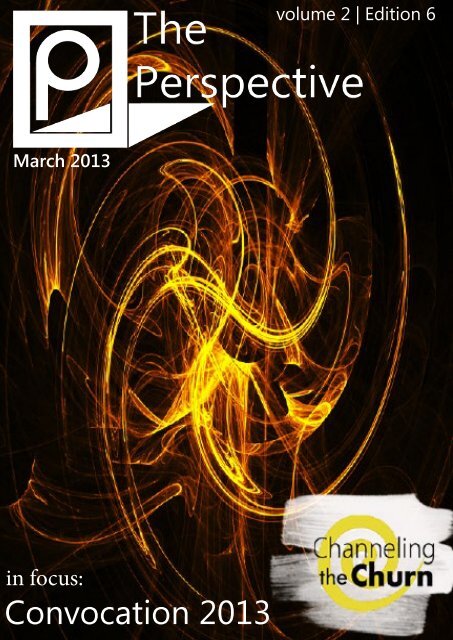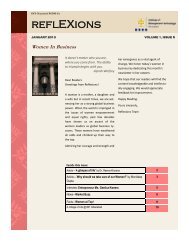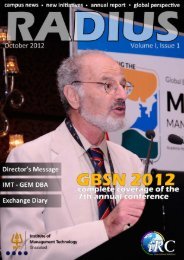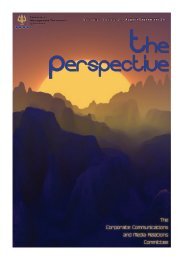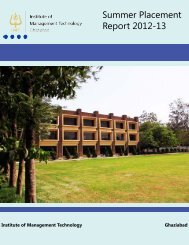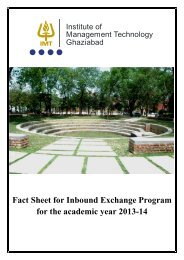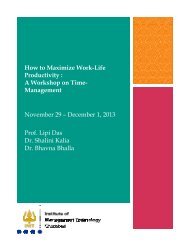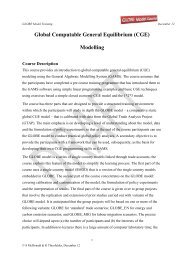Convocation 2013 - IMT
Convocation 2013 - IMT
Convocation 2013 - IMT
Create successful ePaper yourself
Turn your PDF publications into a flip-book with our unique Google optimized e-Paper software.
volume 2 | Edition 6<br />
March <strong>2013</strong><br />
in focus:<br />
<strong>Convocation</strong> <strong>2013</strong><br />
1
The Perspective of<br />
<strong>IMT</strong>-Ghaziabad<br />
Editorial Team<br />
Ankit Sharma<br />
Lakshmi Narasimhan<br />
Dharma Teja Surabhi<br />
Write to us at<br />
newsletter.imtg@gmail.com<br />
p<br />
Highlights of<br />
<strong>Convocation</strong><br />
<strong>2013</strong><br />
06<br />
Editor’s<br />
Perspective<br />
04<br />
07<br />
Dean’s<br />
Address<br />
2
Channeling the<br />
churn - Their view<br />
08<br />
Their View<br />
14<br />
Their View -<br />
Seniors on Juniors<br />
Workshops galore<br />
@ <strong>IMT</strong>G<br />
12<br />
Campus Buzz<br />
Channeling the<br />
churn - Our view<br />
10<br />
16<br />
Coming Soon.....<br />
3
From the<br />
Editor’s Desk<br />
C<br />
ome March, we arrive at an important juncture in our B-School journey. This is the<br />
month when our seniors take that giant stride from being students over the last 2 years<br />
to becoming the managers of tomorrow. The convocation for the batch of <strong>2013</strong> is upon<br />
us and it is indeed with mixed emotions that all of us in the campus look forward to it. It is the last<br />
formal occasion that the seniors get to attend as students of <strong>IMT</strong> and post it, they are alumni. The<br />
baton has now been passed on to us, the batch of 2014, as seniors on whom the incoming batch<br />
would look up to and aspire to be. Our summer internships are imminent and we finally get a<br />
chance to implement our education in real life. We get to enhance our knowledge pertaining to the<br />
practical aspects of management while at the same time, analysing our fit within a particular sector/<br />
industry. The current issue of The Perspective is devoted to <strong>Convocation</strong> <strong>2013</strong>, the theme for which<br />
is “Channelling the Churn”. We take a look at this interesting phrase from multiple viewpoints as<br />
we try to examine its significance for aspiring managers. It is time to remember and thank the seniors<br />
for the experiences and learning that we have gained from them and wish them, a successful<br />
journey on the road ahead. On this note, we present a feature which takes a look at the interaction<br />
among the seniors and juniors from different perspectives. We also dedicate a photo feature to<br />
them which is certain to evoke certain fond memories. Finally I would like to thank The Perspective’s<br />
Editor Emeritus Amit Nayak for his immense contributions towards nurturing and sustaining<br />
this magazine. It is his unflinching efforts over the past couple of years that have given The Perspective<br />
its current standing.<br />
4
5 5
@ <strong>IMT</strong>-Ghaziabad/ see this column in the Voice of <strong>IMT</strong><br />
blog<br />
CONVOCATION<br />
<strong>Convocation</strong> <strong>2013</strong> - Hoghlights<br />
Dean’s Address<br />
CHairperson’s Address<br />
Channeling the churn - Their View<br />
Channeling the churn - Our View<br />
<strong>Convocation</strong><br />
<strong>2013</strong> -<br />
Highlights<br />
The ides of March have always<br />
been a harbinger of change.<br />
Come March 15, a garden of<br />
yellow adorns <strong>IMT</strong> Ghaziabad. The<br />
convocation for the batch of <strong>2013</strong> is<br />
imminent and the students of today<br />
undergo their rites of passage to step<br />
out as the managers of the future.<br />
The convocation serves as a solemn<br />
occasion for the students who are<br />
about to battle it out in the real world<br />
as it is their last formal occasion in<br />
an institute before they sever their<br />
ties to it as a student. The traditional<br />
lighting of the lamp to banish the<br />
darkness and the invocation of Goddess<br />
Saraswathi, the patron of learning,<br />
to dispel ignorance sets the tone<br />
to the occasion.<br />
6<br />
The President’s address delivered by<br />
the Shri Kamal Nath, the honourable<br />
minister for parliamentary affairs<br />
talks about the roles of <strong>IMT</strong> and the<br />
graduating student managers in the<br />
economy from a macro perspective.<br />
This is followed by the Director’s<br />
address which traces <strong>IMT</strong>’s journey<br />
over the past year, taking into cognizance,<br />
the various scenarios playing<br />
out in today’s industries while<br />
plotting the course for the future.<br />
Apprehensions and doubts cloud<br />
student’s minds when they are about<br />
to graduate at a time when India is<br />
experiencing a slump in its growth, a<br />
sign of tough times to come.<br />
Who better to allay these fears and<br />
facilitate the leap of faith than the<br />
behemoth Adi Godrej himself The<br />
man behind the immense and widely<br />
enthral his audience comprising<br />
more than 600 aspiring managers<br />
on the nitty-gritty of the manager’s<br />
responsibilities.<br />
This speech will serve as a great<br />
inspiration to the students who are<br />
fortunate to receive these pearls of<br />
wisdom from a man who, to use a<br />
colloquial phrase, has been there and<br />
done that. With the students’ minds<br />
put to ease and their thoughts dwelling<br />
on the keynote address delivered<br />
by Mr Godrej , it is now time when<br />
the efforts undertaken over the last 2<br />
years come to fruition. The Management<br />
Oath is administered, medals<br />
are awarded to exceptional performers<br />
and the diplomas are handed<br />
over to the beaming students by<br />
Mr Godrej himself while teary eyed<br />
parents look on with pride. As the<br />
shadows lengthen, the convocation<br />
comes to a close with the delivery of<br />
the vote of thanks and the rendition<br />
of the National Anthem. The audience<br />
finally head off to tuck into the<br />
sumptuous dinner prepared with the<br />
usual <strong>IMT</strong> flair, a fitting end to an<br />
event signalling the transition from<br />
one phase of life to the next.
Dean’s Address<br />
“Most of what we call management consists of making it difficult for people to get their work<br />
done.” - Peter Drucker<br />
“That’s been one of my mantras — focus and simplicity. Simple can be harder than complex:<br />
You have to work hard to get your thinking clean to make it simple. But it’s worth it in the<br />
end because once you get there, you can move mountains.” - Steve Jobs<br />
Y<br />
ou stand at the<br />
crossroads of destiny,<br />
eager to begin<br />
your corporate lives as mangers<br />
in reputed organisations at the<br />
same time apprehensive about the<br />
uncertainties of the future. I take<br />
this opportunity to briefly touch<br />
upon a few aspects that are sure<br />
to help you out in your ascent of<br />
the corporate ladder. The above<br />
quotes come from 2 men who are<br />
widely acclaimed in their fields<br />
but from different time periods.<br />
One was an innovator while<br />
another revolutionised management<br />
education with his insights.<br />
What is common however was<br />
their underlying philosophy to<br />
keep things simple. When you are<br />
channelling the churn, you don’t<br />
want to create any more agitation<br />
in the system. You want to remove<br />
the excesses and focus on the<br />
bare essentials. As Randy Pausch<br />
mentions in his last lecture “It’s<br />
all about fundamentals. You’ve<br />
got to get the fundamentals down<br />
because otherwise the fancy stuff<br />
isn’t going to work.”<br />
The last decade has witnessed several<br />
upheavals, be it in the social,<br />
economic, scientific and even in<br />
the religious context. We followed<br />
the sovereign debt crisis while<br />
lending our voice and expressing<br />
our outrage to the social injustice<br />
meted out to women at the same<br />
time wondering on the possibilities<br />
of the Higgs Boson while contemplating<br />
on the impact that the<br />
resignation of His Holiness, Pope<br />
Benedict would have on one of the<br />
oldest institutions of the world.<br />
There is a continuous churn in the<br />
environment, one that is palpable<br />
by the common man and one that<br />
can be easily influenced by the<br />
smallest of actions. Considering<br />
the ever increasing role technology<br />
is assuming in our day to day<br />
lives, it is time we take cognizance<br />
of the fact that a few determined<br />
and focussed individuals can indeed<br />
bring about a massive change<br />
to the world..<br />
As change managers, we must be<br />
at the forefront to anticipate such<br />
scenarios. The agility with which<br />
we respond to new circumstances<br />
is a measure of our resilience and<br />
preparedness for taking advantage<br />
of evolving situations. <strong>IMT</strong> with<br />
its Global Breadth Indian Depth<br />
orientation has equipped you with<br />
the necessary tools to navigate this<br />
maelstrom. Tie ups with International<br />
institutions as well as inputs<br />
from the industries have served to<br />
temper your knowledge and think<br />
from a glocal perspective. With<br />
the lines bordering business ethics<br />
blurring by the day, it is important<br />
to uphold your values and strive<br />
to incorporate them in your work<br />
ethic. A value driven workforce is<br />
one of the keys to sustainability of<br />
the business in the long run.<br />
I wish all of you, the very best of<br />
luck towards a successful career.<br />
Dr. RajendraNargundkar<br />
Senior Dean (Academics)<br />
7
<strong>Convocation</strong> <strong>2013</strong> – Channelling the Churn –<br />
Their View<br />
Amit Nayak, PGDM<br />
(Finance) 2011-<strong>2013</strong><br />
“Never doubt that a small group of thoughtful, committed, citizens can change the world. Indeed,<br />
it is the only thing that ever has.”<br />
-Margaret Mead<br />
T<br />
he rapid pace at which the fight between good and bad<br />
the world is changing but of a force far bigger and much<br />
has been aided significantly<br />
more nuanced, one of technology<br />
through technology and<br />
networking. These technological<br />
changes have not only happened<br />
quickly but have accelerated with<br />
time. They have increased people’s<br />
access to knowledge and<br />
to one another. This has led to a<br />
very complex yet unique situation<br />
which was non – existent thus far<br />
in society. Technological innovation<br />
and the instant dissemination<br />
of information across borders and<br />
traditional barriers are producing<br />
ripples in the social fabric. What<br />
is it that groups of people do in<br />
networks that is shaping the new<br />
paradigm<br />
Such broad questions have no<br />
right answers, but they give us a<br />
perspective on these crucial questions.<br />
Networks of people today<br />
have been able to accomplish so<br />
much and at the same time tearing<br />
through many of the society’s<br />
accepted norms and boundaries,<br />
they have managed to create a<br />
microcosm that is sustainable and<br />
resilient and one that can be mobilized<br />
in the direction of perceived<br />
good or bad in relatively short<br />
time. But, this is not a story about<br />
aided democracy.<br />
Starting from, the ability of<br />
a group of programmers who were<br />
concerned about social evils and<br />
registered their disagreement by<br />
defacing an institution’s website to<br />
where a whole class of people were<br />
mobilized by one man in his late<br />
sixties against the incumbent government’s<br />
corruption to the mass<br />
revolution of these networked<br />
people for political and social<br />
causes in the real world through<br />
technology networks in a relatively<br />
short time is, historically, new,<br />
unique and real. Will such actions<br />
and networks create more good<br />
and reduce the inequities in the<br />
system It is a question that only<br />
time will answer.<br />
While accepting the need for<br />
change created by these complexities,<br />
we recognize that it<br />
is extremely difficult to change<br />
our current habits. Management<br />
education is walking away from<br />
an economic crisis so severe that<br />
the world had not seen one of this<br />
magnitude in more than six decades.<br />
Questions have been raised<br />
on the very assumptions<br />
that fuelled a decade of growth<br />
that uplifted millions from poverty<br />
in China and India, giving wind<br />
to the idea that the new world<br />
order is destined for collapse even<br />
before it is built. The churning in<br />
the environment is palpable, and<br />
the hardships, both economic and<br />
social are expected to remain for<br />
some time to come.<br />
Change can only be gradual,<br />
but we are hopeful and are impressed<br />
by the adaptability shown<br />
by management educationists.<br />
They have changed the structure<br />
and delivery, refocused on<br />
8
management research, strengthened<br />
and redesigned executive education<br />
and extended resources toward<br />
doctoral programs. <strong>IMT</strong> has<br />
been at the forefront of much of<br />
these changes in its own way, channelling<br />
the churn toward India-specific<br />
issues with global insights<br />
shaping this understanding. The<br />
impact the institute wishes to make<br />
will come out of local action and<br />
the networks it manages to create<br />
across students, faculty and alumni.<br />
<strong>IMT</strong> has recognized the role of experience<br />
and industry knowledge<br />
in training future managers and<br />
has established strong relationships<br />
with more than fifty international<br />
management institutions, offering<br />
both student and faculty exchange<br />
programs, enhancing knowledge<br />
transfer across geographical<br />
boundaries. Exemplary performance<br />
of alumni in the business<br />
world has added value and created<br />
an environment for pursuit of excellence.<br />
Faculty driven research<br />
has been the driving force behind<br />
the institute’s establishment of four<br />
centers of excellence, in the areas of<br />
global supply chain, strategic information<br />
management, financial research,<br />
environment management<br />
and the center for rural innovation,<br />
capacity building, knowledge<br />
management, entrepreneurship<br />
and technology management.<br />
Managing of complex micro<br />
– environments and human<br />
networks around them which are<br />
created not just by technology<br />
but by a constant focus on issues<br />
that affect business in the world<br />
today is an area where <strong>IMT</strong> has<br />
made inroads. Technology aided<br />
changes are effervescent and rapid,<br />
their outcomes hard to predict,<br />
their effects intense. This churning<br />
is neither unexpected nor unforeseen<br />
but neglected or poorly<br />
understood. It is this awareness<br />
and the associated changes that<br />
need to be explored. <strong>IMT</strong> has taken<br />
definite steps in that direction.<br />
The uniqueness of the situation<br />
and the strength of the human<br />
networks behind them are<br />
refreshingly new. They offer hope<br />
and a sense of empowerment to<br />
the people involved, much uncertainty<br />
to businesses and vibrancy<br />
to the society overall. Here is the<br />
place to be, now is the time to do,<br />
the channelling of resources in this<br />
direction is bound to strengthen<br />
our understanding of these changes<br />
and networks. Enduring focus<br />
on these emerging changes will<br />
keep us engaged in what is real<br />
and of value, making way for a<br />
deeper understanding and harmony<br />
between society and business.<br />
9
<strong>Convocation</strong> <strong>2013</strong> – Channelling the Churn –<br />
Our View<br />
Lakshmi Narasimhan,<br />
PGDM (Marketing) 2012-2014<br />
What does churning have to do with future managers Why is the theme for <strong>Convocation</strong><br />
<strong>2013</strong>, Channelling the Churn<br />
We shall take these<br />
questions, examine<br />
them in detail<br />
and establish the relevance and<br />
importance in understanding this<br />
simple phrase. Churn refers to the<br />
instrument that is commonly used<br />
to prepare butter by agitating milk<br />
or cream. This process of agitation<br />
is known as churning. The churning<br />
of the ocean to obtain the<br />
nectar of immortality (Amrit) is a<br />
thought that almost immediately<br />
strikes people having some knowledge<br />
of the Puranas and myths of<br />
the Hindu culture. In this decade<br />
marked by agitations and demonstrations,<br />
hunger strikes notwithstanding,<br />
isn’t this churning seen<br />
as a process that only handicaps<br />
the functioning of the institution<br />
What if this “churn” can be effectively<br />
“channelled” to yield butter<br />
Parallels with the social fabric only<br />
draw attention to the presence of<br />
a similar state of turbulence in the<br />
global economy, an economy that<br />
is in recession, one of the worst<br />
seen in the last half a century. Self<br />
styled management gurus and<br />
pundits and leading organisations<br />
alike are unable to crack the code<br />
and find a permanent solution to<br />
this grim phenomenon resulting<br />
in lower margins and bottom lines<br />
10<br />
as well as reduced waistlines and<br />
receding hairlines. Every management<br />
strategy book instructs us<br />
on effectively utilizing the market<br />
conditions and opportunities and<br />
building a unique core competency<br />
and competitive advantage.<br />
Pretty straightforward, you would<br />
agree, but then where lies the<br />
issue The issue lies in viewing the<br />
agitation or the churn as a disturbance.<br />
The issue lies in ignoring<br />
the buttermilk that is the residual<br />
of the churning of milk and focusing<br />
only on the butter. The issue<br />
lies in perceiving the churning<br />
as a temporary opportunity and<br />
not as an ongoing, ever mutating<br />
concern. To use a mythological<br />
hyperbole, churning is perceived<br />
as the Chimera while in reality, it<br />
is the multi headed serpent Hydra,<br />
which sprouts 2 heads when one is<br />
cut off.<br />
The pursuit of quarterly targets<br />
is drilled into every manager,<br />
especially the tyros, resulting in<br />
the sacrifice of long term vision<br />
and sustainability to meet nay<br />
exceed short term performance<br />
goals. With increased emphasis on<br />
data, big data and metadata, not<br />
to mention extended value chains<br />
and advanced supply chains,<br />
today’s managers are developing<br />
tunnel vision. While agility and<br />
change management seem to appear<br />
as possible solutions, channelling<br />
the churn typically looks<br />
into the long term consequences.<br />
One of the best examples is a bespectacled<br />
man clad in loin cloth<br />
mobilising a nation against tyranny.<br />
An example in the business<br />
world is GE about whose transformational<br />
journey under Jack<br />
Welch has been well documented.<br />
In the Indian context we need to<br />
look no further beyond The Tata<br />
group.<br />
As managers, we need to imbibe<br />
in us, a spirit of adventure tempered<br />
with critical thinking in our<br />
outlook as opposed to the rigid<br />
conformance to existing norms<br />
and practices. To channel to<br />
churn, we need to accept churning<br />
for what it is and then identify<br />
appropriate churns and media to<br />
effectively leverage this to the advantage<br />
of the organization. With<br />
the rapid advances in information<br />
dissemination, especially pertaining<br />
to technological advances in<br />
social media and communication,<br />
it becomes even more crucial for<br />
us to derive maximum benefit<br />
from this “organised chaos”.
Life @ <strong>IMT</strong><br />
11
@ <strong>IMT</strong>-Ghaziabad/ see this column in the Voice of <strong>IMT</strong><br />
blog<br />
Campus Buzz<br />
Workshops Galore @ <strong>IMT</strong>G<br />
Their View – Seniors on Juniors<br />
Our View – Juniors on seniors<br />
Workshops Galore @ <strong>IMT</strong>G<br />
Excel Workshop<br />
C<br />
handan and Gaurav of the PGDM 2011<br />
– ’13 batch conducted a three day workshop<br />
on Microsoft Excel. A hundred and<br />
sixty students of the PGDM 2012 – ’14 batch attended<br />
the session in small batches of 50 to 60 students.<br />
Each day saw the delivery of content in three parts.<br />
The morning session that commenced at 10 am before<br />
breaking for lunch at 1 pm involved understanding<br />
the nuances of the tool, shortcuts, charts and<br />
working on examples. The afternoon session from<br />
2 pm to 5 pm, was about using advanced functions<br />
such as index, lookup and pivot tables with example<br />
data. The evening session from 5 pm to 6 pm was<br />
dedicated to sharing of advice concerning the usage<br />
of these tools over the course of the summer internship,<br />
and explanation of what the instructors themselves<br />
had undergone in their internship. The event<br />
was conducted under the auspices of the Centre for<br />
Rural Innovation Capacity building Knowledge management<br />
Entrepreneurship and Technology management<br />
(CRICKET) at the computer lab “Eklavya”,<br />
from 28th Feb to 2nd Mar.<br />
International Business Etiquette<br />
Workshop<br />
A<br />
workshop on International Business<br />
Etiquette called Branding Yourself by<br />
Mrs Mira commenced from 28th Feb<br />
<strong>2013</strong> at the <strong>IMT</strong>G Auditorium. The students of the<br />
PGDM 2012-’14 batch were split into batches of 125<br />
students each for the program which ran uninterrupted<br />
until 2rd Mar <strong>2013</strong>. Classes were suspended<br />
so that students could engage wholeheartedly in the<br />
workshop. The first session, that lasted for 2 hours<br />
dealt with the physical, social and emotional aspects<br />
which make up people before moving on to how<br />
men and women behave and perceive differently<br />
and finally ending with the differences in etiquette at<br />
social and business situations. In the second session<br />
which lasted for an hour, she spoke about the subtle<br />
nuances of body language. Separate sessions for men<br />
and women covered business attire; the final session<br />
was about fine dining practices, the conventions used<br />
and the issues involved. In this session which lasted<br />
for two hours, she spoke about the arrangement of<br />
crockery, the style and poise required at such settings,<br />
adjusting in awkward situations and handling<br />
food in the seven courses at great depth. This was followed<br />
by fine dining practice sessions. In the practice<br />
session students ate with chopsticks and practiced<br />
the nuanced techniques of using the fork, knife and<br />
spoon. The facilitators walked around the dining area<br />
guiding students on the techniques and helping them<br />
overcome the motor function difficulties caused by<br />
these simple objects.<br />
12
Business Strategy Simulation<br />
Workshop<br />
An IIM based entrepreneurship venture<br />
in the educational space, enParadigm<br />
made their presence felt at <strong>IMT</strong> by<br />
conducting a business strategy simulation workshop.<br />
The simulation was based on a mini robot equipment<br />
manufacturer business scenario which unfolded over<br />
a number of financial quarters. Students were split<br />
into teams of 5 members each with 8 teams playing<br />
simultaneously under a given instructor. It was clear<br />
that the teams of young managers were to don a<br />
number of thinking hats, assuming the roles of the<br />
CEO, the marketing head, operations head, R&D<br />
head, HR head and finance head to crack the case<br />
and beat their rivals to run a profitable venture. At<br />
the beginning, there was a business briefing provided<br />
by the instructor, which was followed up by timely<br />
advice between quarters to enhance students understanding<br />
and rationales. Annual presentations by the<br />
CEOs, declaration and analysis of annual results and<br />
a board meeting with the stakeholders and promoters<br />
as well as negotiations ensured that the entire gamut<br />
of practical management principles and business<br />
governance were learnt and employed. How these<br />
thought processes will manifest themselves in the<br />
future, only time will tell.<br />
Presentation skills workshop<br />
A<br />
workshop on presentation skills and<br />
emergent technologies was conducted<br />
by Dr. Geoffrey Clements at <strong>IMT</strong>G.<br />
In the presentation skills session he discussed three<br />
concepts; networking, organizing events and making<br />
presentations. He covered these topics at length while<br />
eliciting inputs from the audience and helping them<br />
out with likely issues they might face as they engage<br />
in these activities. He used as examples, the IBEF for<br />
networking and ICRICKET for organizing. Nuances<br />
of making presentations were also elucidated. In the<br />
emergent technologies session, he spoke about innovation<br />
in the Information Technology (IT) and non<br />
IT space. The examples of Mountain Breeze, the air<br />
ionizer and the mobile joystick, which were invented<br />
by the same inventor under the aegis of the same<br />
company were taken and expounded. While one<br />
went on to become a commercial success, the other<br />
did not do so well. The various aspects of innovation<br />
which made these differences possible were discussed<br />
and analyzed. In the final session, he spoke about 3D<br />
printing and how this exciting additive technology<br />
seems to be at a place where it can change business<br />
scenarios in a number of industries.<br />
13
Their View – Seniors on Juniors<br />
Nidhish Gupta, PGDM<br />
(Marketing) 2011-<strong>2013</strong><br />
I<br />
f a B-school is considered<br />
to be a Train and the<br />
Junior Batch the Wagons,<br />
the Engine has to be the Senior<br />
Batch. Unlike the under graduate<br />
programs, the senior-junior interaction<br />
is of vital importance in<br />
B-schools especially those which<br />
are student driven.<br />
Though the interaction starts<br />
much earlier on the various social<br />
media forums and during the city<br />
meets, the first week of college<br />
is the best time to interact and<br />
is much awaited by the students<br />
across the B-school fraternity.<br />
At <strong>IMT</strong>-G we prefer calling it as,<br />
“The Personality Development<br />
Program” popularly known as<br />
PDP our own euphemism for the<br />
“R” word used by the others. This<br />
is probably because we feel the<br />
outcome is a positive development<br />
in the personality of the incoming<br />
students in terms of getting<br />
acquainted with the “working<br />
environment” at <strong>IMT</strong>.<br />
Unlike previous years, the smooth<br />
conduction of the PDP was hampered<br />
owing to the junior batch<br />
joining two weeks before the<br />
seniors, a higher average work-experience<br />
junior batch and also<br />
because of the students staying at<br />
the CDL campus.<br />
However, despite all odds, scenes<br />
such as juniors formally introducing<br />
themselves to the seniors, answering<br />
questions like Why Mba<br />
and performing various tasks and<br />
skits weren’t unusual.<br />
The degree of interaction seemed<br />
to diminish after the first week but<br />
then the recruitment process of<br />
the various Clubs & Committees<br />
followed by the summer placements<br />
for the first years provided<br />
great opportunity for both<br />
the batches to interact. Also the<br />
various events being conducted<br />
throughout the year especially<br />
like that of “Chakravyuh” and<br />
the “<strong>IMT</strong> parties” have played an<br />
important role in getting both the<br />
batches together.<br />
The junior batch needs to be<br />
appreciated for they have gelled<br />
well with the seniors whether it<br />
be while working with them in a<br />
particular student body, playing<br />
sports or even while partying.<br />
Also the representation of <strong>IMT</strong> at<br />
various inter B-school events has<br />
seen a significant improvement.<br />
On a personal note, In the past<br />
two years of my stay at <strong>IMT</strong>, it<br />
has been a wonderful experience<br />
interacting with my seniors as well<br />
as my juniors apart from my batch<br />
mates.<br />
Though you do not get to choose a<br />
junior or a senior just the fact that<br />
you belong to the same college is<br />
strong enough to bind you together.<br />
This is the beauty of the senior<br />
junior relationship.<br />
Best wishes for the soon to be<br />
senior batch of <strong>IMT</strong> Ghaziabad.<br />
14
Our View – Juniors on Seniors<br />
Ankit Sharma, PGDM<br />
(Marketing) 2012-2014<br />
times also witnessed the emergence<br />
of ‘the 3 year work-ex’ clan<br />
that refused to surrender to the<br />
orders of the senior batch comprising<br />
mostly of freshers. There<br />
were conflicts and then there<br />
were arguments but PDP certainly<br />
bonded us in a way and brought<br />
us in line with the <strong>IMT</strong> way of life.<br />
Now as the seniors gear up to<br />
make their mark in the industry,<br />
we wish them all the best for their<br />
future endeavours.<br />
A<br />
s you traverse the<br />
journey called life,<br />
you encounter a<br />
number of markers that divert you<br />
to untrodden paths, each offering<br />
a new experience. And then you<br />
wonder how incomplete your existence<br />
was without the newly met<br />
travellers.<br />
Our journey with the senior<br />
batch began much before we entered<br />
the hallowed portals of <strong>IMT</strong><br />
Ghaziabad, thanks to Pagalguy,<br />
Facebook and the city meets. But<br />
the interaction got a whole new<br />
meaning when we faced the Personality<br />
‘D’ Programme. The expansion<br />
of the letter ‘D’ is still a<br />
cause of debate. Some call it Development<br />
while others remark it<br />
as Destruction but in retrospect,<br />
it all seems a lot of fun. The PDP<br />
Post PDP, the clubs and committees<br />
got back into action with<br />
their recruitments. SOPs, stress<br />
interviews (that stretched up to<br />
the wee hours of morning) and<br />
anxiety gripped the junior batch.<br />
The seniors dragged us out of our<br />
comfort zone and tested us on<br />
multiple parameters before making<br />
us a part of their family. It was<br />
then that we realized the truth<br />
behind the ‘<strong>IMT</strong> never sleeps’ tag.<br />
More sleepless nights followed as<br />
the clubs and committees came up<br />
with their introductory events. But<br />
most of us never regretted as each<br />
opportunity brought with itself a<br />
new learning.<br />
Be it organizing events, be it summer<br />
placements or be it exams, seniors<br />
were always around to help<br />
us out. They not only facilitated<br />
our seamless transition into the B<br />
School culture but also ensured a<br />
perfect blend of learning and fun.<br />
They introduced us to the famous<br />
<strong>IMT</strong> parties and ensured that we<br />
enjoyed them to the fullest.<br />
15
16<br />
Next Edition...


